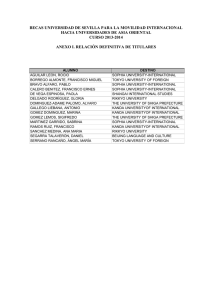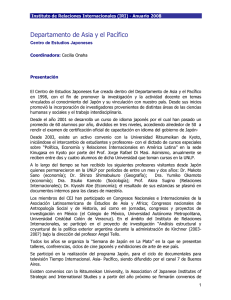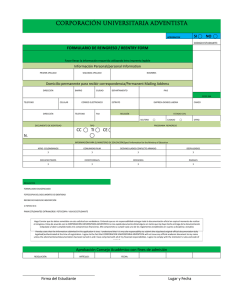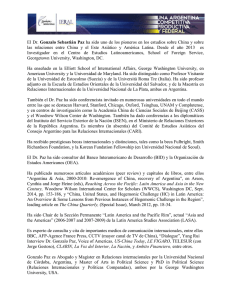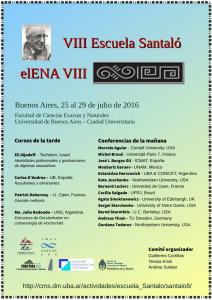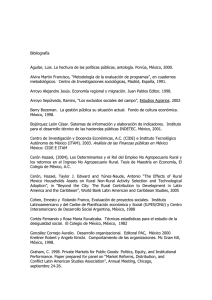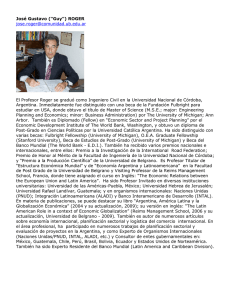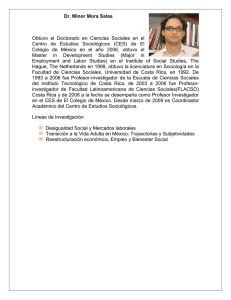Micaela Chávez Villa, Directora, Biblioteca Daniel Cosío Villegas, El
Anuncio
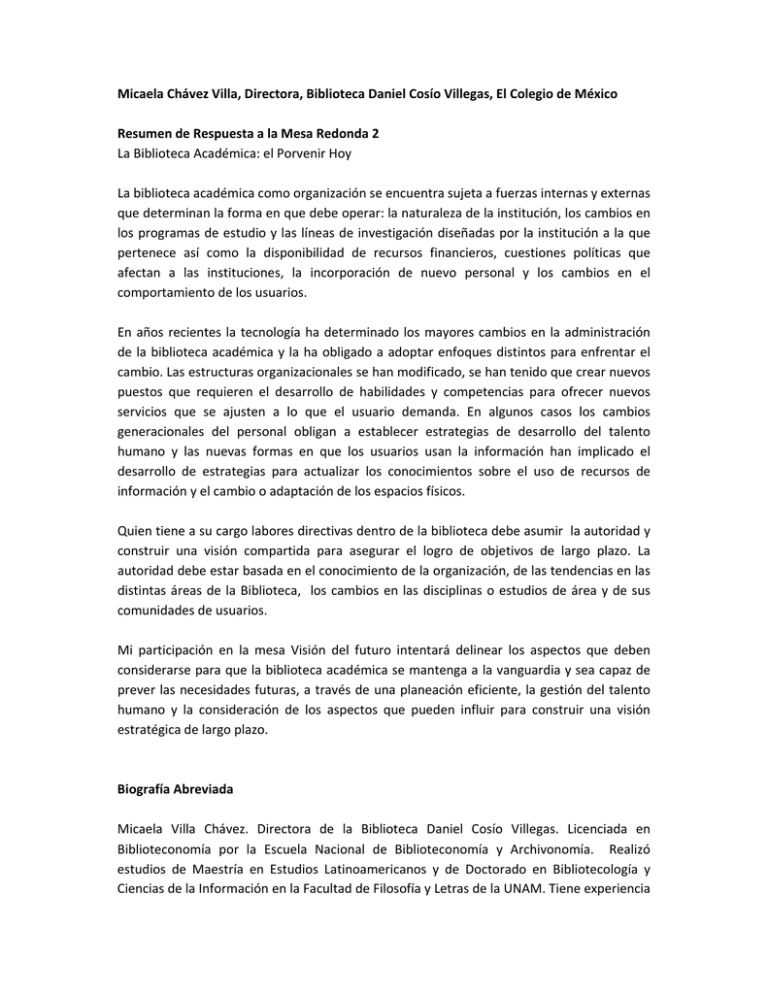
Micaela Chávez Villa, Directora, Biblioteca Daniel Cosío Villegas, El Colegio de México Resumen de Respuesta a la Mesa Redonda 2 La Biblioteca Académica: el Porvenir Hoy La biblioteca académica como organización se encuentra sujeta a fuerzas internas y externas que determinan la forma en que debe operar: la naturaleza de la institución, los cambios en los programas de estudio y las líneas de investigación diseñadas por la institución a la que pertenece así como la disponibilidad de recursos financieros, cuestiones políticas que afectan a las instituciones, la incorporación de nuevo personal y los cambios en el comportamiento de los usuarios. En años recientes la tecnología ha determinado los mayores cambios en la administración de la biblioteca académica y la ha obligado a adoptar enfoques distintos para enfrentar el cambio. Las estructuras organizacionales se han modificado, se han tenido que crear nuevos puestos que requieren el desarrollo de habilidades y competencias para ofrecer nuevos servicios que se ajusten a lo que el usuario demanda. En algunos casos los cambios generacionales del personal obligan a establecer estrategias de desarrollo del talento humano y las nuevas formas en que los usuarios usan la información han implicado el desarrollo de estrategias para actualizar los conocimientos sobre el uso de recursos de información y el cambio o adaptación de los espacios físicos. Quien tiene a su cargo labores directivas dentro de la biblioteca debe asumir la autoridad y construir una visión compartida para asegurar el logro de objetivos de largo plazo. La autoridad debe estar basada en el conocimiento de la organización, de las tendencias en las distintas áreas de la Biblioteca, los cambios en las disciplinas o estudios de área y de sus comunidades de usuarios. Mi participación en la mesa Visión del futuro intentará delinear los aspectos que deben considerarse para que la biblioteca académica se mantenga a la vanguardia y sea capaz de prever las necesidades futuras, a través de una planeación eficiente, la gestión del talento humano y la consideración de los aspectos que pueden influir para construir una visión estratégica de largo plazo. Biografía Abreviada Micaela Villa Chávez. Directora de la Biblioteca Daniel Cosío Villegas. Licenciada en Biblioteconomía por la Escuela Nacional de Biblioteconomía y Archivonomía. Realizó estudios de Maestría en Estudios Latinoamericanos y de Doctorado en Bibliotecología y Ciencias de la Información en la Facultad de Filosofía y Letras de la UNAM. Tiene experiencia profesional en las áreas de Referencia, Catalogación y Clasificación, Desarrollo de Colecciones y Administración de Bibliotecas. Desde la década de 1990 ha propiciado el desarrollo de varios proyectos digitales dedicados a la difusión de recursos académicos producidos en El Colegio de México. También ha hecho contribuciones significativas para la conformación de consorcios y el desarrollo cooperativo de bibliotecas digitales en México. Es miembro activo del Comité Mexicano para el desarrollo la Biblioteca Virtual de la Letras Mexicanas dentro de la Biblioteca Virtual Miguel de Cervantes, y miembro activo de la Red Mexicana de Repositorios auspiciado por la Corporación para el Desarrollo de Internet (CUDI). Es miembro de la Asociación Mexicana de Bibliotecarios (AMBAC) y del Seminario para Adquisición de Materiales Latinoamericanos (SALALM). Thomas F. Reese, Professor of the History of Art and Executive Director of the Stone Center for Latin American Studies, Tulane University. Response Abstract to Roundtable 2 “Reports of my death are grossly exaggerated,” Mark Twain [and the Research Library] Charles Hale and Dan Hazen cogently address the challenges of our more global and digitally‐connected world to inherited practices in both area studies and research libraries— highlighting not only the threats, but also the opportunities for innovation in the wake of major transformations of values, practices, and media economies. Their essays and most of the recommended readings understandingly focused on changes rather than continuities. Hazen’s exemplary exploration of the impact of “emergent complexity, a general feature of evolving systems” on the economics of collection strategies, as well as on theory and reference services, conjured the image of a revolution that will demand new paradigms, rather than the continuing evolution of an institution whose primary role has been the preservation and transmission of knowledge. My presentation will address three questions. The first is the most critical—will the expanded field provided by the digital revolution demand the reshaping of the core values of collection development in research libraries? I challenge that assertion, while admitting that they do invite them to adapt, innovate, and evolve as they have since the invention of the printing press. The second question is whether the ascendency of preoccupations with “studying Latin America from the North” diverts attention, and collections, unduly from the examination of paradigms and knowledge produced from the East and the West? The third question, however, is for me perhaps the greatest challenge to knowledge regimes, notably the ever expanding importance of images and imaging technologies in a world that acknowledges that textual and visual knowledge are distinct, if interrelated, realms, yet is challenged not only by how to catalogue images, but also how to create innovative interfaces among images and texts. Short Biography Thomas F. Reese is Executive Director of the Roger Thayer Stone Center for Latin American Studies, Tulane University. He attended Tulane University (B.A., 1965) and (Yale, Ph.D., History of Art, 1973). He taught at the University of Texas in Austin (1970‐86), served as Deputy Director of the Getty Research Institute in Los Angeles (1986‐1999), and was appointed Executive Director of the Stone Center for Latin American Studies at Tulane University in 1999. He was awarded a John Simon Guggenheim Memorial Foundation Fellowship (1976‐77), was elected Académico correspondiente, Real Academia de Bellas Artes de San Fernando, Madrid (1977), and was appointed Samuel H. Kress Senior Fellow, Center for Advanced Study in the Visual Arts, The National Gallery of Art, Washington, D.C. (1983). He served as Vice‐President of the College Art Association of America (2002‐04), and President of the board of the Arts Council of New Orleans (2010‐13), and is currently Co‐ Chair of the Council of Directors of Title VI National Resource Centers for Foreign Language and Area Studies (2015‐) His scholarship and publications include studies of eighteenth‐ century Spanish urbanism and politics, culture contact in sixteenth‐century Mexico, devotional space in Colonial Andean society, and contemporary architectural practice in Europe and the Americas. Since 1990, his work has focused on images and identity in turn of the century Argentina, Mexico, and Panama. His most recent book George A. Kubler: the Craft of Art History will be published in 2017 by the Getty Research Institute. He is also completing with Carol McMIchael Reese the second volume of El Canal de Panamá y su legado arquitectónico, which will be published by the Ciudad del Saber, Panamá. Solange M. Santos (presenter at the roundtable), Publishing coordinator of SciELO/FAPESP Program Abel L. Packer (co‐author of response), Director of SciELO/FAPESP Program and Project Coordinator at the Support the Federal University of São Paulo (UNIFESP) Response Abstract to Roundtable 2 The SciELO Network professionals’ competencies: interaction between local and global information flows Changes on informational, educational and research landscapes due to globalization continue to impact developing and emerging countries academia in many areas of studies traditionally enclosed within national frontiers. As a consequence, the recruiting, mentoring and training of information related professionals have become more and more complex functions in order to meet the diverse combination of required competencies to deal with national and international information resources, different communities of practice , increasing importance of interdisciplinary as well as the development of a critical awareness and capacities to overcome the many barriers presented on interaction between local and global information flows. Our reflection on these issues is grounded on our work experience with the Scientific Electronic Library Online (SciELO) Network, that encompasses an international community of professionals from 15 countries involved on the development of national collections of open access peer reviewed academic journals. A closer examination of the role played by the information related professionals reveals that they are involved in a wide range of processes that require critical and refined set of skills such as: mastery on scholarly communication process and procedures; capacity to interact with researchers, editors, authors and experts; negotiation skill alongside academic institutions and funding agencies; project management involving the actors of scientific communication; and also, good knowledge on bibliometrics and scientometrics (classical and alternative indicators) to support committees of performance and assessment of science, among others needs. Beyond the formal academic degree, interdisciplinary and globalized context require an open‐minded approach towards the needs of training, mentoring and recruiting informational professionals. This is a challenge for managers, scholarly, and library and information science schools, from developed or emerging countries, nowadays and in the near future. Presenter’s Short Biography Dr. Solange Santos has graduated in Librarianship from University of São Paulo (USP), Brazil, in 2001. She obtained her MSc degree in Information Science from University of São Paulo, in 2008, and PhD degree in Information Science from USP, Brazil, and Universidad Carlos III de Madrid, Spain in 2015, where she developed her interest in scientific communication, Scholarly journals and Bibliometric Indicators. Since 2002 she is member of the Executive Board of SciELO Program. She is also a member of National Association of Post graduation in Information Science and Library (ANCIB). Alberto Vargas Prieto (presenter at the roundtable), Associate Director, Latin American, Caribbean, and Iberian Studies, University of Wisconsin‐Madison Francisco Scarano (co‐author of response), Professor of History, Director, Latin American, Caribbean, and Iberian Studies, University of Wisconsin‐Madison Response Abstract to Roundtable 2 As we look into the future, Latin American studies programs ought to be aware of the challenges and opportunities of new technologies for libraries and collections, and thus plan to focus on making sure that the faculty, students and community constituents they serve have the resources to update their skills and perspectives on research, teaching and learning. Specifically, we envision two sets of minimum skills that have to be developed: 1) awareness and familiarity with the potential (and also risks) of new hardware and software for information gathering, analysis and storage; 2) skills to analyze and integrate vast amounts of information into a contextual new perspective. This new perspective ought to include a clear vision of inclusivity, accessibility and diverse learning environments to minimize the digital gap that new technologies may bring about. We will offer in our presentation some reflections on the cultural and political dimensions of information handling and dissemination that Latin American studies program can take into account as they plan for the future. Presenter’s Short Biography Alberto Vargas is the Associate Director of the Latin American, Caribbean and Iberian Studies (LACIS) program at the University of Wisconsin – Madison since 2005. He is interested in interdisciplinary approaches to research, teaching and outreach related to the area of concern of LACIS. Alberto holds a Bachelor's degree in general agriculture from the Monterrey Technological Institute in Mexico and an M.S. from Texas A&M University. His Ph.D. is in both Forestry and Land Resources from the University of Wisconsin‐Madison. Alberto has conducted research and implemented projects in agriculture, forestry, energy and coastal resource management in Latin America, the Caribbean and the United States.
